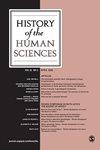从阶级起源到个体精神病理:根据国家社会主义捷克斯洛伐克犯罪学的配偶谋杀
IF 0.5
2区 历史学
Q2 HISTORY & PHILOSOPHY OF SCIENCE
引用次数: 0
摘要
在40年的国家社会主义进程中,捷克斯洛伐克犯罪学家对配偶谋杀的解释发生了重大变化。犯罪学家最初将犯罪归因于犯罪者的阶级出身、资产阶级生活方式的残余,以及在漫长的20世纪50年代缺乏来自集体的积极影响,然后在所谓的“正常化”时期(包括国家社会主义的最后20年),犯罪学家将注意力重新集中在个人的精神病理学上。基于对档案资料的分析,包括学术期刊和专家报告,并遵循伊恩·哈金(Ian Hacking)的见解,即通过知识体系的重新调整,“各种各样的人应运而生”,本文展示了随着犯罪学专业知识的转变,新型配偶杀人犯是如何出现的。我们将这一变化解释为犯罪学精神化的结果,发生在捷克斯洛伐克,当时政权需要在1968年布拉格之春的动荡之后巩固。谋杀配偶的犯罪学框架完全属于私人领域的个体化领域,反映了当时政权将私人领域封闭为国家相对不干涉的领域的努力。本文章由计算机程序翻译,如有差异,请以英文原文为准。
From class origins to individual psychopathology: Spousal murder according to state socialist Czechoslovak criminology
Over the course of 40 years of state socialism, the explanation that Czechoslovak criminologists gave for spousal murder changed significantly. Initially attributing offences to the perpetrator's class origins, remnants of his bourgeois way of life, and the lack of positive influence from the collective in the long 1950s, criminologists then refocused their attention solely on the individual's psychopathology during the period known as ‘Normalization’, which encompassed the last two decades of state socialism. Based on an analysis of archival sources, including scholarly journals and expert reports, and following Ian Hacking's insight that ‘kinds of people come into being’ through the realignment of systems of knowledge, this article shows how new kinds of spousal murderer emerged as a result of shifting criminological expertise. We explain the change as the result of the psychiatrization of criminology that occurred in Czechoslovakia at a time when the regime needed to consolidate after the upheavals of the Prague Spring of 1968. The criminological framing of spousal murder as belonging squarely in the individualized realm of the private sphere reflected the contemporaneous effort of the regime to enclose the private as a sphere of relative state non-interference.
求助全文
通过发布文献求助,成功后即可免费获取论文全文。
去求助
来源期刊

History of the Human Sciences
综合性期刊-科学史与科学哲学
CiteScore
1.60
自引率
11.10%
发文量
31
审稿时长
>12 weeks
期刊介绍:
History of the Human Sciences aims to expand our understanding of the human world through a broad interdisciplinary approach. The journal will bring you critical articles from sociology, psychology, anthropology and politics, and link their interests with those of philosophy, literary criticism, art history, linguistics, psychoanalysis, aesthetics and law.
 求助内容:
求助内容: 应助结果提醒方式:
应助结果提醒方式:


